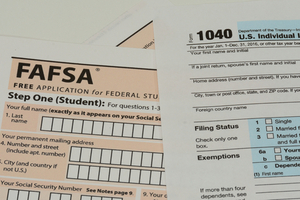Divorce can be a frustrating time for children of all ages, especially teens. They may be finishing their up their last year of high school and getting ready for college, while dealing with the challenges that come with their parents’ split. One thing that can be particularly challenging is the financial aid process.
For those who need help paying for college, the U.S. government offers a whopping $120 billion in financial aid, in the form of loans, grants, and work-study programs. However, a lot of that money ends up unused due to the cumbersome process involved.
A lot of families fear the Free Application for Federal Student Aid (FAFSA) form because of the number-crunching involved. Having to provide details about income can be so time-consuming that many people ignore the form and ultforego the opportunity to have their college paid for. Complicating things further is the fact that many students are unsure how the process works if their parents are divorced. Are there any differences? Are both incomes needed?
Regardless of your parents’ marital status, you should take the time to complete the FAFSA if you plan to attend college next year. This form determines eligibility for student loans and scholarships. It also allows you to apply for federal grants. You can apply now. The application window started on October 2 and closes on June 30, 2020. You must file in time in order to receive financial aid for the 2020-21 school year.
How Divorce Relates to Financial Aid
A divorce can affect your financial aid in a number of ways. First, if your parents are divorced, the custodial parent is the one responsible for filling out the FAFSA. The custodial parent refers to the parent you lived with the most during the 12 months prior to the date you fill out the FAFSA application, so it is not based on calendar year. This may or may not be the same as the parent who has legal custody of you. If you did not receive any financial support from either parent in the past year, use the most recent year in which you did receive any support. If your parents never married, they are treated the same as divorced parents, for FAFSA purposes.
While the non-custodial parent’s income is not included on the FAFSA, any income that the custodial parent receives from the other parent, such as child support and alimony, must be included on the FAFSA. Some private colleges do expect applicants to include the non-custodial parent’s income, though. The non-custodial parent will have to fill out a supplemental financial aid form. This form solely affects the school’s own financial aid.
Determining household size is another confusing issue. A child may claim to belong to two different households, so which household is relevant? Typically, the custodial parent will count the student as a member of their household. However, if the non-custodial parent provides the majority of the student’s financial support, then they would be allowed to list the student as a member of their household.
Is a Parent Required to Pay for College?
Child support obligations typically end when the child reaches age 18. However, there is sometimes an exception for those in college. The non-custodial parent might still be required to pay for college tuition.
Therefore, parents who are divorcing may want to have a college support agreement in place. This written agreement should specify which parents are responsible for college expenses and any limitations. For example, is the support limited to a certain amount of time (four years of school or age 24, for example)? Does the student have to attend a certain school or get a minimum grade point average? What is included in the college support—just tuition, or books, room and board and other costs? There should be no confusion as to what each parent is expected to contribute.
Mistakes to Avoid
If college is part of your or your child’s future plans, here are some things to keep in mind:
- Fill out the FAFSA. Many families do not bother because they assume they will not qualify. You may be surprised. Almost every family will qualify for some sort of aid. Even if your parents make too much money, you may be eligible for scholarships and merit-based awards. You also cannot get a federal loan without a FAFSA, so do not lose out on these sources of financial aid.
- Do not procrastinate. You have until June 30 to complete the FAFSA, and while that may seem like a lot of time, a lot of families procrastinate. Get all the information you need early on in the process. Start thinking about colleges to which you want to apply. Both students and parents need to apply for a Federal Student Aid ID, so do that now.
- Putting in the wrong data. Number-crunching is not everyone’s forte, and with the simplified tax forms for 2018, FAFSA applicants may experience some compatibility issues. This means your application may get flagged for errors, which can delay the process. Review your tax forms and double-check the numbers before submission.
Seek Legal Help
If your child is going off to college, you may be confused about the financial aid process. You probably have many questions about income and custody, but do not overlook this valuable financial resource.
Palm Beach divorce attorney Scott J. Stadler can help you with various aspects of the divorce process. We can help you move on with ease. To schedule your consultation, call (954) 346-6464.

